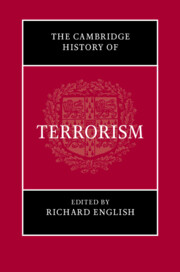Book contents
- The Cambridge History of Terrorism
- The Cambridge History of Terrorism
- Copyright page
- Contents
- Figures
- Tables
- Acknowledgements
- Contributors
- Part I Introduction
- Part II Frameworks and Definitions
- Part III Historical Case Studies in Terrorism
- Part IV Thematic Essays
- 20 ‘September 12 Thinking’
- 21 The History of Terrorism and Communication
- 22 Terrorism, History and Religion
- 23 History, Terrorism and the State
- 24 Into the Labyrinth
- 25 Gender Politics and Terrorist Histories
- Part V Conclusion
- Index
- References
22 - Terrorism, History and Religion
from Part IV - Thematic Essays
Published online by Cambridge University Press: 07 May 2021
- The Cambridge History of Terrorism
- The Cambridge History of Terrorism
- Copyright page
- Contents
- Figures
- Tables
- Acknowledgements
- Contributors
- Part I Introduction
- Part II Frameworks and Definitions
- Part III Historical Case Studies in Terrorism
- Part IV Thematic Essays
- 20 ‘September 12 Thinking’
- 21 The History of Terrorism and Communication
- 22 Terrorism, History and Religion
- 23 History, Terrorism and the State
- 24 Into the Labyrinth
- 25 Gender Politics and Terrorist Histories
- Part V Conclusion
- Index
- References
Summary
It seems unarguable that religious belief and practice have contributed on occasions in the past to the generation and sustenance of terrorism. Moreover, the contemporary persistence of religious commitment suggests that such long-rooted processes may have life in them yet. In relation to terrorism as to much else, those who espouse a religious faith probably deserve more serious-minded, respectful attention than scholars sometimes afford them. Certainly, in settings where religious values and beliefs have undeniably contributed in complex ways to the dynamics of terroristic violence (such as Afghanistan and Israel/Palestine), the assumption of an evaporative quality to religion and its effects would seem profoundly ill judged. And if terrorism is potentially most revealing in regard to the world-historical forces with which it intersects, then examination of the multilayered relationships between terrorism, history and religion represents a major challenge. Accordingly, this chapter suggests that the precise nature of the important and complex relationships between terrorism and religion might helpfully be examined through addressing the following four historically minded questions. First, should religious belief and practice be seen more as causes of terroristic violence, or as restraining influences upon it? Second, has religious terrorism represented an existential threat, or more of a horrific nuisance? Third, is religious terrorism a novel phenomenon, or a recognisably familiar one? Fourth, is religion a detachable part, or an organically inextricable feature, of the beliefs which can lead to terrorist activity?
- Type
- Chapter
- Information
- The Cambridge History of Terrorism , pp. 551 - 570Publisher: Cambridge University PressPrint publication year: 2021

